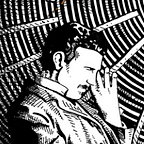Al Kratz talks about linked flash, life’s failures, and reflection in Graziano’s chapbook.
Nathan Graziano
Fiction | Flash | 36 pages | 5.5” x 8.5” | Reviewed: Letterpressed Cardstock
978–1–937073–38–1 | First Edition | $8.00
Bottle of Smoke Press | Dover, Delaware | BUY HERE
Hangover Breakfasts by Nathan Graziano is a great chapbook of 26 connected and addicting flash pieces that tell the story of a group of friends in their twenties, primarily at a lake house, usually drinking or doing drugs, always trying to discover if there will be more to their lives.
It is part Walden with drugs replacing transcendentalism, part On the Road with reality replacing the ideal, and part Jesus’ Son with a lighter, safer tone.
The stories are narrated by the unnamed protagonist whose reflections are the heart of the collection. He is looking back on a distinct phase of life, one on the brink, spent discovering who he is, what is possible and what is out of reach. He is aware, both in reflection and while in the moments, that there never will be a more significant time in life — both for its success and failure.
The feasts lasted for hours as we smoked pot to smooth our headaches and cigarettes to punish our lungs. Like amateur sleuths, we’d try to stitch together the events of the two previous days, blushing at ourselves. All of us seemed to know we had something to hold, and all of us seemed to know it wouldn’t last forever.
(“Hangover Breakfasts,” p. 10)
A lot of the reflection is in the subjunctive. The elusive What If, just out of reach.
And Jill, what if I kissed you? Would our bodies have dissipated and we become sparkles on the lake’s surface, two specks leaping among everything horrible yet still so very beautiful?
(“Bad News,” p. 5)
The longing to seize the moment, capture it in a bottle, to get it right, is palpable. The failure to do all of that is heartbreaking. These emotions make the collection more than just party stories. In “Wine Balloons,” the protagonists drink several boxes of wine. When they finish each one, they inflate the wine bags and hang them from the ceiling like ornaments.
I grabbed a pen and my cork-covered journal and tried writing a poem about it. But I never got it right. I never looked up and saw those wine balloons hanging like lungs above me.
(“Wine Balloons,” p. 12)
The contradictions of his reflections become his real hangover. It is the most important time in his life, although, in a lot of ways, he has nothing to show for it. It’s all he can remember, and it’s also all he has forgotten.
It was as if we never lived together on that lake with Ray. … It was as if those frozen days after the ice storm, when the power was out and the four of us were huddled by the woodstove in the kitchen, had been swallowed by a hole in the sky.
(“Tracks,” p. 24)
In a direct nod to one of his heroes, the story “Hey, Jack Kerouac” covers a road trip and shows the strength of the compression in these pieces. In four brief paragraphs, he shows why these characters made their choices and what they got for making them. The hangover might have been in the character’s loss, but it also was the reader’s feast.
This review has been moved from its original home on The Spark blog, where it was first published on February 15, 2016. The Spark is now defunct, and all features have migrated to The Coil for posterity.
